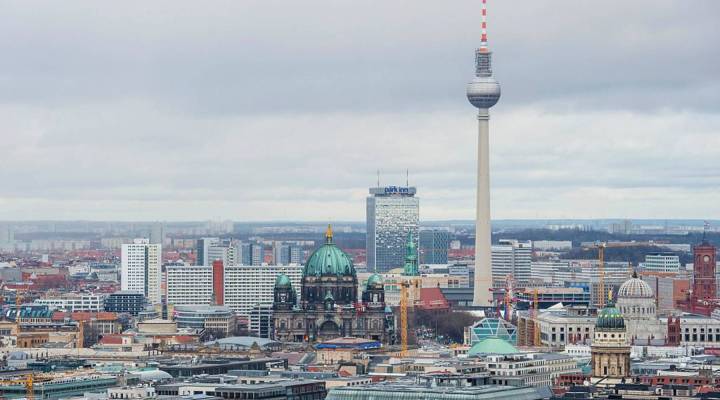
After Brexit vote, luring London businesses to Berlin
After Brexit vote, luring London businesses to Berlin

Not long after the Brexit vote, a truck with a billboard on its side started driving around London, with the message: Dear Startups, Keep Calm and Move to Berlin. It was sponsored by a German political party trying to get companies based in the U.K. to shift their operations to Germany. The big question now is, will they?
Germany, and to some extent France, are trying to pull off what you might call “economic land grabs” — wooing companies, and people, who would otherwise have been based in Britain.
Investor and entrepreneur Simon Schaefer took Marketplace on a tour of a space he’s building in central Berlin’s Mitte district. Schaefer hopes to create hundreds of jobs. He’s the founder and CEO of Factory, which is sort of a tech accelerator, co-working space and startup network rolled into one. He refers to his new space as “Silicon Allee.”

Simon Schaefer thinks of his new space as “Silicon Allee.” The building’s third and fourth floors are already bustling with scientists.
Schaefer took Marketplace through the building under construction, which looms over a busy street in Mitte. When finished, it will house a coffee shop and bar, grocery store and office space. The building’s third and fourth floor are already bustling — a social network for scientists is in that space. And on top, Schaefer and his team are creating apartments for people who want to live in this little hive of tech activity.
Schaefer, who advises the European Commission on technology issues, is feeling pretty good about Germany’s position in the tech world right now.
“If you look at every single piece of legislation that is focusing on growth in Europe, it’s usually about the digital space and how to unify that across border,” he said. “And how to be competitive against the hegemonic superpowers in the internet: China and the U.S.A.” He sees Brexit as the U.K. turning its back on being in a competitive market.
It’s part of his marketing pitch, but Schaefer said he thinks startups will come to Berlin or Paris any place where they have access to the European single market. Something that a British-based company can’t guarantee without EU membership.
Several other forces — not just Berlin’s tech community — are trying to win business post-Brexit. A financial lobbying group in Frankfurt has been promoting the city to foreign banks. France’s president has said he wants Paris to be the center of finance in Europe. One thing that could stand in the way is taxes. Germany’s corporate tax rate is roughly 30 percent. France, 33 percent. Britain, only 20 percent.
Of course, the other part of this equation is people. On a recent night, thousands of people, most of them young, flooded into the area around Berlin’s Brandenburg Gate to watch Germany play France in the Euro 2016 soccer semifinals.
Twenty-nine-year-old Ben Ndao, from the U.K., said that before the Brexit vote, he planned to return to the U.K. No longer.
“I’ll stay here,” he said. “I’ll apply for a German passport and I’ll stay.”
Ndao’s generation has known nothing but a united Europe. One where they can work, study and travel anywhere within its boundaries.
And that’s something that Germans, in general, want to keep, according to pollster Peter Matuschek.
“We have persistent approval for European integration as a whole, with more than 90 percent backing this idea of having an integrated Europe,” he said.
Indeed, after the Brexit vote, support for the Eurosceptic party the AfD declined, while support for Angela Merkel’s pro-Europe Christian Democrats increased. That means that a policy of open borders and open doors, for people and companies, is here to stay for now.
There’s a lot happening in the world. Through it all, Marketplace is here for you.
You rely on Marketplace to break down the world’s events and tell you how it affects you in a fact-based, approachable way. We rely on your financial support to keep making that possible.
Your donation today powers the independent journalism that you rely on. For just $5/month, you can help sustain Marketplace so we can keep reporting on the things that matter to you.












